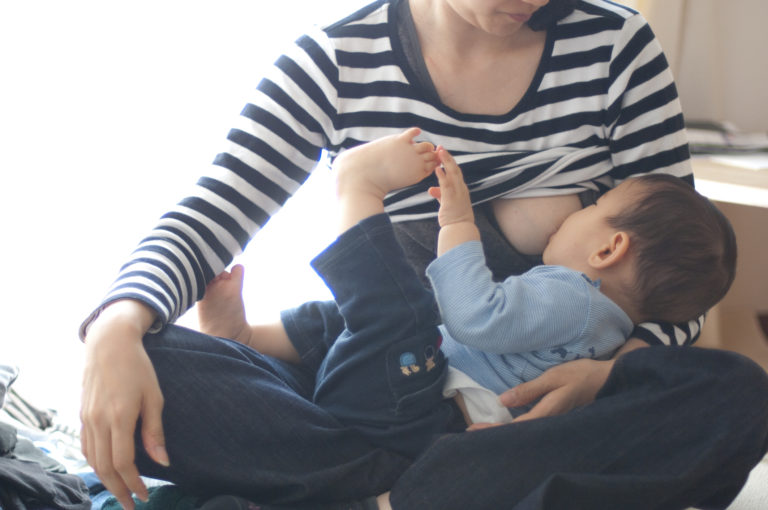Many traditional cultures recognize the time period right after a birth as being an opportunity for new parents to rest and recuperate. In the Chinese tradition of Zuo Yue Zi (or “sitting the month”), for example; new mothers are expected to stay at home and rest for a full 30-40 days after their new arrival, while grandmothers and other female relatives take over all daily household tasks. Mom’s only job is to rest and feed the baby.
During this time period, the new parents are fed regenerative broths to help rebuild their bodies after the labor process and to promote lactation. Keeping warm is another important part of the tradition as bodies after birth are particularly susceptible to cold, so in strict cases moms are forbidden to wash their hair, go outside into the cold air, or consume cold or raw foods. In even more serious versions, the new parent’s emotions are protected by limiting visitors, TV watching, and even reading, so that the outside drama doesn’t unnecessarily affect the new family.
Translating the rules of Zuo Yue Zi into a busy modern life might seem tricky, maybe even ridiculous. These days it seems new parents are barely able get more than a a couple weeks off for parental leave and even if you are able to take a good chunk of time off, our culture tends to reward parents who “bounce back” quickly after a new baby arrives. This can conjure up an intense feeling of pressure to keep up with events at the office and the world at large, for fear they might lose their position in both places if they dare allow themselves proper downtime.
It might be time to challenge this trend and see if we can’t adjust to healthier expectations. After all, becoming a parent is physically and emotionally taxing – you have created and are now tasked to care for an entirely new life!
How can the old ideas of self-preservation and protection of the new parent apply in today’s context? Here are some of my suggestions:
1) Set expectations at work for parental leave
Know your state and federal laws about parental leave. As of 2018 in New York State, most employers are required to allow 8 weeks of partially-paid parental leave. Even better news, this amount of time and pay will increase incrementally to as much as 10 weeks at 67% weekly pay by 2021. To find out more and to see if you are eligible, visit:
Talk with your boss about how much they expect you to be available. Advocate for yourself as much as possible, explaining that you’ll be far more productive when you’re back, if you have uninterrupted time to rest and bond while you’re away.
For those who are self-employed, this article has some helpful ideas about how to set a balance between your first baby (your business) and your actual offspring.
2) Know your own limits
First-time parents who are lucky enough to have generous leave can get a little too ambitious about everything they expect themselves to accomplish with ALL THAT TIME OFF! Remember: finding optimum emotional and physical health within your new family dynamic is enough work for anyone.
This isn’t the time for cleaning the linen closet, reorganizing the spice cabinet, or getting ahead on your blog posts.
Taking the time to really rest and bond with your baby is all you need to be doing. Give yourself a gentle pass on everything else.
Similarly, don’t try to rush to regain your “pre-baby body” or “feel like your old self”. Make sure you feed and care for yourself and your baby in the healthiest way, without worrying about a specific weight goal or clothing size, unless otherwise instructed by your doctor. After all, trying to reboot what once was is not nearly as satisfying as fully flourishing in what is now and new.
3) Prioritize your own self-care
Lunch with friends, yoga, meditation class, acupuncture, massage…. Whatever self-centering practice you find most restorative, schedule them for Weeks 4, 5, 6 now. It’s not too early. It’s easy to make excuses why you can’t spend time away from baby when you’re in the thick of dirty diapers and sleepless nights. Even parents who are dealing with more serious issues need a little time away to regroup. If an event is already on the calendar, it can be a helpful reminder to take care of yourself first. It’s also a great time to check in about any physical or emotional issue you might be dealing with. Trained practitioners can help you resolve these new concerns, or refer you to other resources to help.
If you have a partner, it is important for them to pre-schedule time out as well. Think about establishing a rhythm of your time with baby, my time with baby, our time with baby, our time with us; things become much happier and sustainable in the long run.
4) Call in the seasoned veterans
Recruit the people in your life you know you can rely on. Ask older generations to be on hand, especially immediately after the baby’s arrival and for as many weeks following as possible. As the new generation arrives, there’s often a primal urge to relate to those who have done this before us. Not everyone has an ideal relationship with their own parents or in-laws, so sometimes having Grandma and Grandpa come “help” is actually no help at all. If you have any older, experienced friends or family members, don’t hesitate to reach out and ask them to come lend a hand. It’s OK to feel overwhelmed sometimes. This is no time for a go-it-alone attitude! Maybe there’s a neighbor or friend who has older children who can drop in and lend a hand. If you have the resources to hire a postpartum doula to guide you through step-by-step, or a night nurse, or a daytime nanny to watch Baby while you get extra sleep, go for it. If not, find those in your tribe who can offer the wisdom of experience and pitch in when you need it most. You might not always agree in the every detail of how you are raising Baby, but it helps to not have to reinvent the wheel each time.
5) Rethink your baby shower
Can you have too many onesies with super-cute baby animals on them? Probably. And a bouncy chair is hugely useful, when you’re not tripping over it in your tiny apartment. All this baby gear just means more stuff to clutter up the house; consider asking for gifts of help instead:
- House Cleaning gift certificates
- Food delivery plans (homemade or store-bought, especially warming, nutrient-rich soups and stews)
- Babysitting IOUs
- Self-care gift certificates: acupuncture, massage, blow out, pedicure, etc.

Many friends who have kids already will give the gifts they found useful when they had newborns. These choices are usually great! For everyone else, ask them to pitch in on things that will keep the day-to-day pressures at a minimum.
6) Go easy, find your flow
Easier said than done! Newborns come with so many issues: Are they eating? Are they sleeping? Are they pooping? Why do they CRY. SO. MUCH?! With each phase of fussiness or stress, new parents can’t help but wonder: “Is this my new normal, forever??” Generally, the answer is no.
This is good to remember when you don’t have older, more experienced friends and family helping you out. Many new parents worry intensely over one particular element in their infant’s development, only to realize that suddenly that issue has resolved and another has taken its place. If you can set yourself a mantra of “this too shall pass”, you’ll save yourself and your little one a lot of stress. Always consult your pediatrician or other healthcare provider if you are concerned about something going on with your child. (That’s what they’re there for.) But also know that a lot of what infants do is pretty weird – and that’s ok! Take a deep breath and you’ll be surprised to find that the thing your were obsessing about a few weeks ago is just a fond memory now. This flexibility will be one of the most crucial skills you’ll learn being a parent.
Viewed from this perspective, ancient confinement traditions might not be as outmoded as they first appear. Their core message is actually now more important and inspiring than ever: a healthy parent means a healthy family.






